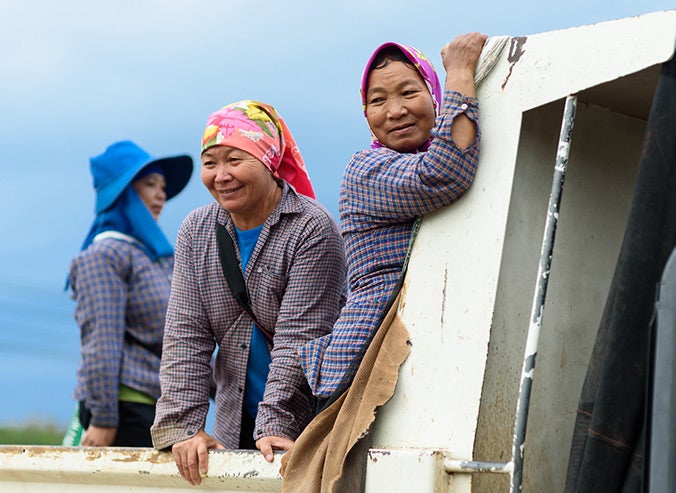ASEAN agencies from different sectors join forces to improve the protection of women migrant workers in crisis situations
Date:
Press release
For immediate release
Four ASEAN sectoral bodies, overseeing women’s and children’s rights, migrant workers, and disaster management, met in Manila today for the first time to discuss the particular challenges facing women migrant workers in crisis situations. Women migrant workers are often the most vulnerable to crises, and have the least access to support services and tools in their host countries.
Manila, Philippines — Migrant women workers in the Association of Southeast Asian Nations (ASEAN) face widespread discrimination and abuse, yet are often cut off from the mechanisms and services that could support them. Better inter-sectoral coordination is needed to protect women migrants and meet their needs.

This was the message from the first inter-sectoral dialogue, held on Friday 15 December in Manila, to discuss a scoping study on how to protect and empower women migrant workers, in particular in crisis or disaster situations.
“We need to ensure that all migrant workers can count on the protection of their basic economic, social, cultural and civil rights,” said Anna-Karin Jatfors, Deputy Regional Director of UN Women Asia and the Pacific and Officer-in-Charge. “This includes access to essential services such as education and justice, as well as health services including sexual and reproductive health. And in times of crisis, this means access in particular to effective legal and emergency health services.”
“Only when women have this level of agency can they unlock the potential of migrant work to improve their economic and social circumstances, bringing benefits to their families back home, and to the host communities where they live and work.”
The meeting brought together representatives from four relevant ASEAN sectoral bodies: the Commission on the Promotion and Protection of the Rights of Women and Children; the Committee on Women; the Committee on Migrant Workers; and the Committee on Disaster Management. They met in the Philippine capital to discuss the findings of the scoping study, and to identify possible next steps to remove some of the barriers that women migrant workers run into when trying to access support mechanisms and tools, especially during crises. The research also examined the various difficulties facing women migrants at each stage of their migration journey.
The key findings of the scoping study include:
- Women remit up to 17 per cent more of their income than men. This leaves them with less money available to deal with shocks and crises in their host countries.
- The more agency a woman has when planning to migrate, the more successful she tends to be. Improving women’s ability to choose allows them to gain more secure employment, stay safer, and save more money.
- Crisis and disaster situations in the host countries impact the most vulnerable the hardest: women migrant workers, especially those without formal status.
- Policies and regulations could be made more effective, both in their design and their enforcement. But the greatest immediate opportunity lies in improving women migrant workers’ access to existing protective policies and systems in the host countries, and helping them reintegrate back home.
- Current barriers to that access include lack of documentation, low levels of trust and awareness, financial vulnerability in destination countries and under-developed systems for reintegration in the home countries, in particular in the wake of a crisis.
- ASEAN can help by reducing the cost and complexity of securing legal employment for women migrant workers – reducing the pressure to enter the informal sector. More can also be done to make it easier for women to communicate with officials and support groups in cases of crisis.
- Addressing these issues would drive the protection and empowerment of women migrant workers in all settings. But it would also help improve the well-being of 63 million ASEAN citizens – the estimated number of women migrant workers and their direct dependents across ASEAN by 2025, - and add a potential 6 billion dollars to the bloc’s economic development by the same date.
ASEAN is uniquely placed to help tackle this issue, in particular with regards to financial inclusion and regional coordination. The next steps at an ASEAN level could include a regional insurance mechanism dedicated to migrants in crisis situations, and building a regional coordination platform with support from civil society to help connect women migrant workers with their families back home, and to help coordinate host countries’ response to disasters.
Media Inquiries:
Montira Narkvichien
Regional Communications Specialist, UN Women | M: +6681 6688900 | Email: [ Click to reveal ]
About UN Women:
UN Women, or the United Nations Entity for Gender Equality and the Empowerment of Women, works to eliminate discrimination against women and girls, to empower women, and to achieve equality between women and men.